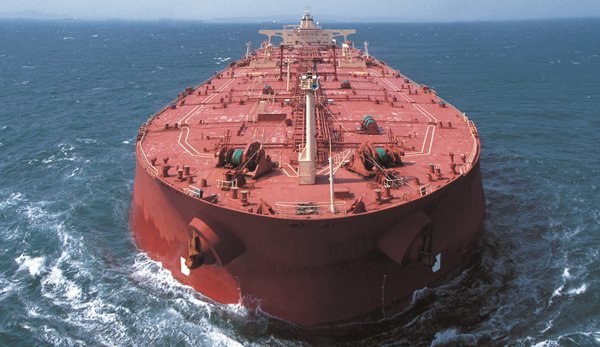Global decarbonisation agenda could see huge swathe of merchant fleet become stranded assets

Tanker owners have been given a stark warning today that potential radical global decarbonisation agendas could see tanker demand fall by slightly more than a third through to 2050 with many ships in the merchant fleet becoming stranded assets.
Moreover, the report from Maritime Strategies International (MSI) has some alarming predictions for dry bulk owners, based on likely drops in coal demand. The value of the world’s dry bulk ships could more than halve from $195bn in 2018 to $90bn by 2030.
The report entitled ‘The implications of radical decarbonisation for the shipping industry’ prepared on behalf of the European Climate Foundation looks at how shipping will change if the goals of the Paris Agreement are met.
The analysis projects two demand frameworks – ‘Reduction’ and ‘Reference’ – designed to provide broad narrative and structure to long-term global energy demand.
Global energy consumption in the Reduction scenario is largely based on projections made for pathways consistent with limiting warming to 1.5°C above preindustrial levels, as described in the IPCC SR1.5 report. The Reference scenario is designed to provide a comparison to Reduction. Although it describes a more limited change in the global energy consumption profile, Reference still incorporates substantial restraints on future energy consumption.
The more extreme Reduction scenario is the focus of the report, under which fossil fuel demand sees radical decline over the next three decades. By 2050 world coal consumption falls by 80%, oil consumption halves, and gas demand drops by about a quarter .
Whilst some sectors of the shipping industry, such as containerships, would be virtually unscathed, those for which hydrocarbons comprise a significant proportion of – or all – the cargo mix would undergo decades of falling demand. The results, detailed in the report, would be multi-decade declines in fleet capacity, earnings and asset prices across the affected sectors. Shipowners would be forced to slash new ordering and scrap uneconomic vessels.
Overall, MSI’s models suggest that under the Reduction scenario, tanker demand would fall by slightly more than a third. Bulk carriers would also see demand from coal transportation fall by around half, but overall demand for bulkers would fall by 14% from 2020 to 2035 before returning to modest growth in the latter part of the forecast as the expansion of grain and minor bulks trade offset shrinking coal cargoes.
Earnings for a capesize bulker would spend the 2030s averaging roughly half of their long-term median earnings, whilst for a VLCC earnings would underperform their long-term median by around a third, the MSI report posits.
In a section subtitled Carbon Carrier Crisis?, analysts at MSI predict that under the Reduction scenario, the tanker fleet would fall by around a third over the two decades after 2030, whilst the dry bulk fleet would shrink for nineteen out of twenty years from 2025, shedding 14% of capacity relative to its 2024 peak.
Asset prices would also be hammered, with a benchmark five-year-old capesize bulker losing 40% of its 2018 value by 2030 under the Reduction scenario, whilst a VLCC would slide by 29% over the same period with the lower decline due to the weak tanker market in 2018 rather than any real resilience.
“[D]iscussion of these potentially disastrous demand-side dynamics is almost totally absent from the shipping industry,” MSI noted in the report.
“The concept of ‘stranded assets’ has gained increased traction in recent years, mostly to refer to reserves of coal, oil and gas that cannot be burned due to tightening emissions regulation and price competition from renewable energy sources. Most analysis of the financial risk of stranded assets has focused on the ‘upstream’ part of the energy sector, or electricity generation, especially coal-fired power stations.
“This report broadens the debate to encompass the fact that coal, oil, and liquified natural gas are all internationally traded commodities, relying on maritime shipping to function. The discourse within the finance community regarding such concepts can now hopefully be extended to shipping departments and the wider shipping industry,” the report concluded.
Commenting on the report, Stephanie Pfeifer, CEO of the Institutional Investors Group on Climate Change (IIGCC) said: “As MSI’s research shows, the maritime sector is heavily exposed to the transformation underway across the global energy sector. Investors will expect companies to do more to pre-empt and address the implications from reduced demand for fossil fuels.”
IIGCC is the largest European investor group on climate change, representing over 170 members with over £19trn in assets collectively under management.
Kingsmill Bond, new energy strategist at Carbon Tracker, commented: “This is an important new angle on one of the areas which is vulnerable to the early stages of the energy transition, and as such, an early warning signal.”
Marie Cabbia Hubatova, research analyst at the Environmental Defense Fund, added: “The shipping industry will itself need to move away from using fossil fuels to move their ships. Luckily the production of alternative fuels from renewable energy around the world can provide fuel for shipping, and development opportunities for any country producing the shipping fuels of the future. Shipping as a guaranteed, predictable source of energy demand can unlock investment into untapped renewable energy resources around the world.”
James Mitchell, a manager at the Rocky Mountain Institute, said the MSI report ought to make investors think twice about spending on shipping.
“With tens of billions of potential stranded capital, investors must seriously engage shipowning companies to stress-test their newbuilding and vessel acquisition plans in line with robust Paris scenarios,” Mitchell said.
The MSI Paris Agreement report follows hot on the heels of 11 banks creating the the Poseidon Principles, throwing their weight behind shipping companies that align with the IMO’s 50% greenhouse gas reduction target.
